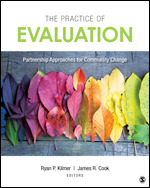The Practice of Evaluation
Partnership Approaches for Community Change
- Ryan P. Kilmer - University of North Carolina at Charlotte, USA
- James R. Cook - University of North Carolina at Charlotte, USA
Included with this title:
The password-protected Instructor Resource Site (formally known as SAGE Edge) offers access to all text-specific resources, including a test bank and editable, chapter-specific PowerPoint® slides. Learn more.
Supplements
edge.sagepub.com/kilmer1e
Online resources included with this text
The online resources for your text are available via the password-protected Instructor Resource Site, which offers access to all text-specific resources, including a test bank and editable, chapter-specific PowerPoint® slides.
“I really like the way this book is not about just methods, it is about practice, and reflects my own approach to teaching evaluation: lots of real-world examples, methods that fit the contexts and feasibility, and a text that is both readable and builds on classic concepts.”
“The editors and authors have made challenging evaluation concepts easy to understand, and available in one concise, well-written resource. Thank you for making this information available for students and practitioners alike!”
“This book provides valuable, relevant information that will help students learn to appreciate and utilize program evaluation as practitioners in various fields. The focus on collaboration makes it relevant to current real-world realities of organizations and systems.”
“This book is comprehensive and well-structured. The new models and ways of thinking introduced are refreshing, and the examples provided cover various settings and will resonate with readers from diverse backgrounds. I will definitely refer to this book when conducting the internal evaluation of our next grant, and I can’t wait to share some of the take-aways with my students.”
It is written from a perspective that aligns with my approach to teaching the course. I was a reviewer when the book was proposed and have been waiting for it to be published so i could adopt it for this course.



